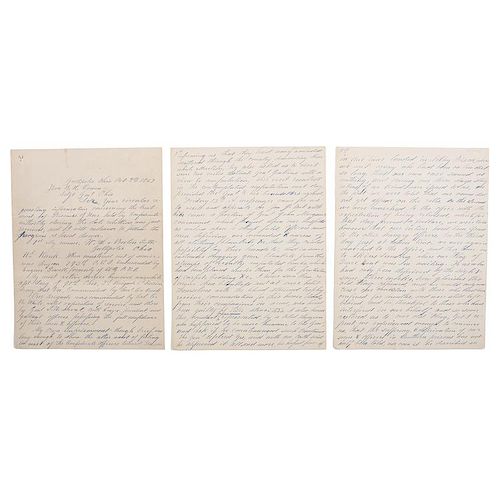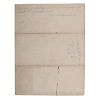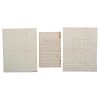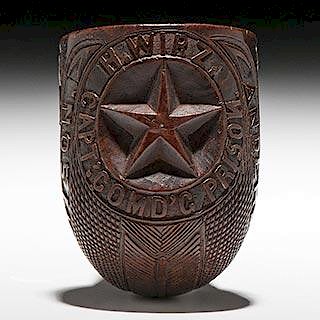Civil War Surgeon and Libby Prison POW William S. Newton Manuscript Archive
About Seller
6270 Este Ave.
Cincinnati , OH 45232
United States
With offices in Cincinnati, Cleveland and Denver, Cowan’s holds over 40 auctions each year, with annual sales exceeding $16M. We reach buyers around the globe, and take pride in our reputation for integrity, customer service and great results. A full-service house, Cowan’s Auctions specializes in Am...Read more
Two ways to bid:
- Leave a max absentee bid and the platform will bid on your behalf up to your maximum bid during the live auction.
- Bid live during the auction and your bids will be submitted real-time to the auctioneer.
Bid Increments
| Price | Bid Increment |
|---|---|
| $0 | $25 |
| $500 | $50 |
| $1,000 | $100 |
| $2,000 | $250 |
| $5,000 | $500 |
| $10,000 | $1,000 |
| $20,000 | $2,500 |
| $50,000 | $5,000 |
| $100,000 | $10,000 |
About Auction
Feb 21, 2017 - Feb 22, 2017
Cowan's Auctions dawnie@cowans.com
- Lot Description
Lot of 167 Civil War-period letters from surgeon William S. Newton, 91st Ohio Infantry and 193rd Ohio Infantry, including a written testimony of his experience as a prisoner of war at Libby Prison. In a rare occurrence, Newton's 13-year-old son visited him at the front during battle for more than a month. He writes about his son's visit as well as the Battle of Winchester, sending slaves to Ohio to help his wife, two occasions of shootings as a result of adultery involving army personnel, daily proceedings at an army hospital, and more. Included in the lot are transcriptions for all letters that are chronologically ordered in file folders labeled by the month and year as well as exhaustive research on Newton's term of service and his regiment. The following entry is a small sample of the contents of his correspondence.
By 1882, 59-year-old William S. Newton was a haggard looking man. The attendant who filed his application for an invalid pension noted that he had a sallow, pale complexion and greying hair; a result of a litany of issues he contracted as a prisoner of war. Nine months after he submitted his application, he would be dead.
Prior to his service in the Civil War, Newton must have been a handsome man. He was five foot nine inches tall with a dark complexion, dark hair, and brown eyes. A practicing physician, he enlisted in the army on September 17, 1862 as an assistant surgeon for the 93rd Ohio Volunteer Infantry. At present, I have charge of the Hospital, while Warrick attends Surgeons Call in camp every morning, explained Newton to his wife. Carpenter is counselling physician, and takes charge of the hospital supplies, makes out certificates for furloughs and discharges. We have plenty to occupy our time, can hardly have time to get homesick, or know how time passes (October 1, 1862). He and his colleague Warwick were very busy with daily operations. They received, on average, about 40 soldiers a day with minor complaints. Still, as he prepared medication and addressed their ailments, he managed to care for his family in Ohio. When his wife wrote about his daughter Kate's illness he diagnosed her symptoms as a cold working itself out and prescribed her a mixture of chalk and diaphoretic powder every four hours (Camp at Point Pleasant, October 5, 1862). In his letters, he also complained about the frustrations of paperwork and a physician's limited power. We can only [authorize furloughs] when we believe death of permanent disability would be the result if not granted. So when the men go to their captains, colonels or any other officers to beg for a furlough, they always send them to a Surgeon for a certificate, at the same time knowing how little we can do for them, wrote Newton (Point Pleasant, October 7, 1862). He struggled to watch sick men march long distances without rest because his regiment lacked a sufficient amount of ambulances and his captain ordered the men sleep without their tents.
Common colds and dysentery would no longer be the chief complaint of soldiers after they finally saw action that fall. The day before a battle against General Morgan's men, Newton predicted there would be a fight. He wrote to his wife, The Rebs have been reinforced and will dispute our advance at every available point, and they may be in force to thrash us. But our troops do not think so, and it will take a large force to stop us (October 23, 1862). Instead of tending to the wounded at the rear, he found a spot on a nearby hillside to watch the battle at Camp Pocatalico. The skirmish ended in a Union retreat, which forced Newton to leave behind 30 soldiers in the hospital tent.
The weather grew cold and rations ran low as they continued to march through the fall. Travelling through burned towns near Ganley Bridge, Newton noted the devastation, [there is] nothing to eat for man or beast, except what we bring with us...You can have no idea of the destruction of property in this valley (Ganley Bridge, November 3, 1862). To his disgust, his tent became infested with rebel body lice about the size of a half grain of coffee and lizards, seeking a warm place to rest, crawled into his bunk at night (Ganley Bridge, November 14, 1862). The regiment moved along in the winter to the spring, when more fighting commenced. On the cusp of an attack, he wrote:
We have had exciting times here, and are expecting an attack almost nightly. They dare not attack with a small force, or we would have been troubled long ago. They are all around us in small squads, stealing horses, capturing Union men, etc. Some of our bushwakers came in this evening, bringing four extra guns, which they said they found, but we strongly suspect they killed the men who had them. Their motto is "take but few prisoners" which I am inclined to think is the best plan after all (Summerville, April 12, 1863).
He prompted his wife in many letters to permit their sons to visit him at the front. Remarkably, she consented and let their 13-year-old son, Ned (Edward) travel 110 miles into harm's way. When Ned arrived he spent many afternoons fishing and waiting for his father to finish his work. Several battles occurred during his stay. One morning, in the middle of particularly thick action, Newton left his son in an ambulance to perform his duties closer to the front. He returned to camp close to dark. Ned much rejoiced at my return, and is now sleeping away, as quietly as if no Rebs were in a hundred miles of us, he wrote to his wife (Fayetteville, May 18, 1863). The battle raged for two more days. In a second letter, he wrote, The shell burst very near to us, yet we feel, we have as good position as yet be obtained...[the Rebels] opened on us at 4 A.M. and have kept it up almost constantly...Give yourself no uneasiness for I shall take care of Ned and act prudent. As a matter of course I cannot write anything while the booming of cannons at every moment strikes the ear (Fayetteville, May 20, 1863). Ned returned home safely, most likely to the great relief of his mother.
Newton was promoted to surgeon of the 193rd Ohio Volunteer Infantry on March 14, 1865. His installment could not have come at a better time for the new regiment, because they were in desperate need of medical personnel at the battle of Winchester. After the battle he wrote:
This Thursday eve and the first moment I have had since our hard fought battle Monday to write, read, or rest. Having charge of Div Hosp, everything seemed to fall on me, and while the battle was going on, I marched 8 miles with my train, put up my tents, got ready for the wounded by 2 p.m., and from that time on, all night even, the wounded came in as fast as I could get places for them. After filling my tents and flies, took a large brick house and filled 4 rooms as thick as they could lie on the floors. Our brave boys went in nobly, and were very anxious...when they began to bring the Jonnies to the rear by the hundreds, could hardly restrain the sick from going to the front...we whipped them soundly, and captured 3 to five thousand prisoners. The command pressed on to Strasburg, driving and capturing many more.
A messenger just came in from the front, says a hard fought battle was had today, all ambulances are again ordered out. There will be many more wounded, and I don't know what will be done with them, for all of Winchester is a hospital (Winchester, VA, Sept. 22, 1864).
Two weeks later, Newton wrote:
My hospital is getting thinned out somewhat, sent fifteen to Martinsburg yesterday, have one or two die each day. Some are getting able for duty...My eyes have been much affected by dressing so many wound, so much so that for two days, I have avoided them as much as possible...There are many scenes transacted here, which show the horrors of this rebellion. Such as parents looking for sons, brother seeking brother, and wife in search of husband. Those who have braved the dangers of being captured by guerrillas come here, to find their friends or relatives, perhaps dead or buried. Others search whole days on other Hospls and at last find their dear one, in the last agonies of death. All are anxious to take their friends home, whether living or dead, and this, makes much confusion and trouble, for they think, doctors can accomplish anything if they only use their influence, hence we are importuned (Winchester, VA, October 8, 1864).
Towards the end of October, the Union could no longer contain the rebels. Newton and his staff were forced to flee again. He wrote:
[I] left [my underclothes], the dirty ones, for the Rebs. We saved almost everything, had we stayed to save all, would no doubt be well on toward Richmond...After starting the ambulances and wagons, I mounted Old Tom [his horse] with great difficulty, for the noise and hubbub made by moving out the train, and the firing of guns on the left, and on the Pike in our rear, had well nigh crazed him...Col. Thoburn, commander of a division, Dr. Shannon, who like me, was in charge of a Div. Hospt, and others rode into the town, and were killed. My curiosity was not great enough to lead me in, I was satisfied in hearing the guns that Rebs must be there...We passed on till out of danger. We met Genl. Sheridan with a strong cavalry force going to the front. He seemed to infuse courage and security to all, men who were going to the rear with their arms fleeing to a safe position...I allowed [my ambulances] up with no company except orderly Turner, he was well armed with two six shooters, and we kept a sharp lookout for Mosby's men...Our own men were in the main, first attended to, for Sheridan not only whipped them, on the same evening, but drove them on to Woodstock, 6 miles beyond the point of attack in the morning, capturing 46 pieces of artillery, and recapturing 15 pieces which they had taken from us in the morning, making more than 60 in all. We also captured trains, med. supplies, horses, cattle, and many prisoners. After all our wounded were cared for, and sent off to Winchester, they sent to my hospital 66 Reb wounded. We went to work on them. and when finished we packed them in ambulances and wagons, and stated them off also for Winchester (Hospital 2nd Div Army West Virginia Near Cedar Creek, VA Oct. 23, 1864).
Newton dutifully wrote to his wife almost on a weekly basis throughout his service, but, for the month of May 1864, his letters ceased. Two years after the war's end, he wrote about what occurred that month. At the Battle of Cloyd's Mountain, he and other members of his staff stayed behind to care for 400 dying and wounded soldiers. On Friday the 13th, after spending several days caring for men on both sides, a portion of General Morgan's men came to the hospital:
They preyed upon our hospital as wolves upon a sheep fold. Officers and men depriving our wounded and nurses of all clothing, blankets, etc. that they could possibly lay their hands on to, and in some instances dragging gum blankets from the stumps of recently amputated limbs which had been placed under them for protection of carpets bedding etc. I have seen them remove these blankets and at once habit themselves with the blood stained trophy, receive commendation for this heroic deed from their companions in arms, who have been guilty of like atrocities. I also heard this conduct represented, by a Rebel surgeon who happened to be more humane, to his Genl, and asked if he countenanced such treatment. The Genl replied yes, and with an oath said he approved it all, and more he hoped few of the D---d Yankees there wounded would ever live to see their homes again (Gallipolis, OH, October 8, 1867).
They took everything, including surgeons' tools dripping with warm blood, and forced the breathing to march. Confederate soldiers gave Newton and his staff two choices: travel further South and assist Rebel hospitals or be interned at Libby prison. Newton and his staff chose Libby. At Libby, Newton described, we met many who had been on low diet for so long, that our own case seemed as nothing, and during our three days stay, rations of no kind were issued to us (Gallipolis, OH, October 8, 1867). Forced to sleep without sufficient cover and given poor rations, Newton contracted malaria as well as dysentery and piles. His liver became torpid, giving him a sallow, pale complexion. Although he never fully recovered, after he recovered enough, he returned to the front to perform his much needed duties.
Provenance: N. Flayderman and Co., Inc.Very good condition with typical folds and toning of the paper. There are no original envelopes. Some have pencil markings on the letters but does not inhibit their legibility.Condition
- Shipping Info
-
SHIPPING. At the request of the buyer, Cowan's will authorize the shipment of purchased items. Shipments usually occur within two weeks after payment has been received. Shipment is generally made via UPS Ground service. Unless buyer gives special instructions, the shipping method shall be at the sole discretion of Cowan's Auctions, Inc.. Cowan's is in no way responsible for the acts or omissions of independent handlers, packers or shippers of purchased items or for any loss, damage or delay from the packing or shipping of any property.
-
- Buyer's Premium



 EUR
EUR CAD
CAD AUD
AUD GBP
GBP MXN
MXN HKD
HKD CNY
CNY MYR
MYR SEK
SEK SGD
SGD CHF
CHF THB
THB













